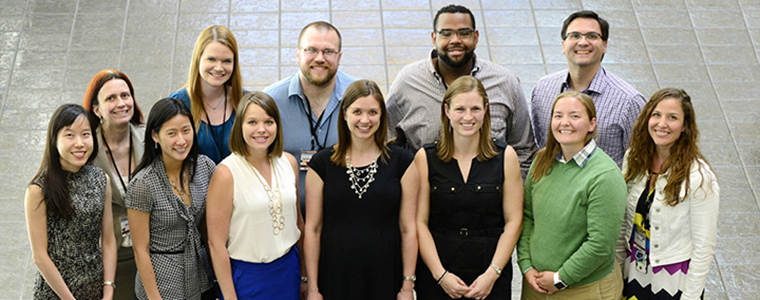Vacation and Holiday
Fellows' Career Development

Vacation and Holiday
Fellows' Career Development
(Source: NIH Intramural Policies for Trainees and Fellows)
Vacation, Sick Leave, and Family Leave for Trainees

Fellows are provided with up to thirty (30) days of leave per award year for a full-year appointment. The balance is set on their initial award start date, and resets annually on the renewal date if the fellow receives an award renewal for a full-year appointment.
If an award renewal is for a period less than one (1) year, leave balances will be prorated based on the duration of the renewal and noted clearly in the renewal letter. The prorated leave balance is provided in full at the start of the short-term renewal.
Leave balances do not accrue or rollover year-to-year. Unused leave has no monetary value.
Fellows are not required to track their fellowship schedule daily. However, they are expected to certify that they met their fellowship obligations each week and to track professional development time and leave using the Fellowship Attendance and Schedule Tracker (FAST).
Parental leave
All non-FTE trainees receive twelve (12) weeks of excused absence with stipend for the birth, adoption, or foster care placement of a child. If the trainee and their spouse/partner are both NIH trainees, both individuals receive 12 weeks, which can be spilt to best support the family. Trainees and fellows who feel pressured not to take parental leave, or who are told there is no flexibility in the timing of the leave, should reach out to OITE for guidance.
Absent Without Stipend (AWoS)
When a fellow exhausts their leave balance for a calendar year or needs more leave than is available, they may request placement in absence without stipend (AWOS) status. Inquiries and requests should be directed to [email protected] to discuss options and procedures.
Military leave
Trainees may use additional excused absences to accommodate military obligations, i.e., active duty, active duty training, and inactive duty training. Military leave should not exceed six weeks per year.
Fellowship Time, Schedules, and Absences Policy
Vacation, Sick Leave, and Family Leave for Employees
The regulations and policies governing the various leave programs available to civilian employees of the NIH can found in the NIH Leave Guide for Civilian Employees. A brief summary of the main points can be found on page 48 of the Advanced Trainee Handbook 2021.
NIH trainees who are appointed as employees (Research Fellows and Clinical Fellows) accrue both sick and annual (vacation) leave. The rate at which annual leave is accrued is a function of the length of time in Federal service (including the military).
Individuals who have been employed by the Federal government for less than 3 years earn annual leave at a rate of 4 hours per pay period or 13 days per year. Employees with more than 3 but less than 15 years of service earn 6 hours per pay period or 19.5-days per year. After 15 years of service, annual leave is accrued at the rate of 8 hours per pay period. All employees earn sick leave at a rate of 4 hours per pay period. This information applies to individuals working a 40-hour week. Part-time employees accrue leave on a prorated basis.
Annual leave allows employees time off for vacations, personal reasons, and emergencies. Sick leave can be used when an employee is incapacitated or contagious; for employee or family member medical, dental, or optical examinations; to care for a family member; or to arrange or attend a funeral. For a complete listing of allowed uses of sick leave and definitions of terms such as "family member," please see the NIH Leave Guide.
A maximum of 240 hours of annual leave may be carried over from one year to another. Leave in excess of this amount is termed "use or lose"; such leave is forfeited if it is not used by the end of the calendar year. In some instances an employee may be granted advance annual leave. This will not exceed the amount of leave the employee is expected to earn prior to the end of the appointment or the end of the calendar year, whichever comes first. It is also possible to request advance sick leave.
You should use the ITAS system to request approval from your Leave Approving Official, generally your supervisor, in advance, for use of annual leave and sick leave to cover appointments. Emergency sick leave should be requested, when possible, within an hour of the time at which you were expected to begin work.
The Family and Medical Leave Act (FMLA) of 1993 provides up to 12 weeks of unpaid leave for one or more of the following reasons: birth of a child, adoption or taking on a foster child, care of a family member with a serious health condition, or a serious health condition that prevents the employee from performing the functions of his/her position. Note that annual and/or sick leave can also be used for these purposes. The Federal Employees' Family Friendly Leave Act (FFLA) entitles an employee to use up to 104 hours of sick leave per year to care for family members experiencing an illness, injury, or other condition (pregnancy, childbirth, medical exam) that would be covered by sick leave were the employee experiencing it or for purposes relating to the death of a family member.
Employees can also use up to 24 hours of leave without pay per year to participate in school activities such as parent teacher conferences or to accompany a child or elderly relative to routine medical or dental appointments. Employees are entitled to meet the requirements of their religious beliefs without taking leave. They will be expected to make up this time by performing approved overtime work either before or after the religious observance. Other categories of leave include Military Leave, Court Leave, and leave for volunteer activities.





